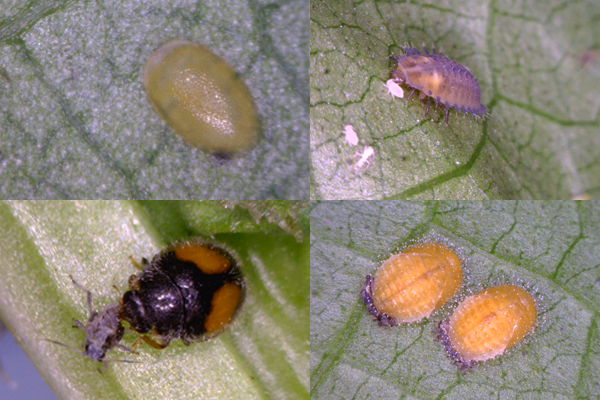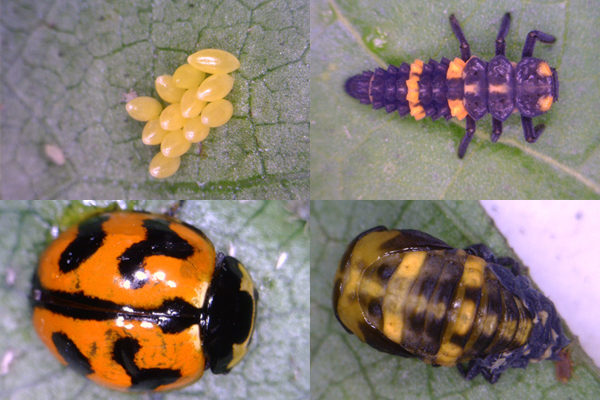The minute two-spotted ladybird beetle (Diomus notescens) and the transverse ladybird beetle (Coccinella transversalis) are two natural enemies of cotton aphid (Aphid gossypii). They are commonly found in Australian crops, however relatively little is known about their biology.
A series of laboratory experiments were conducted by the Queensland Department of Agriculture and Fisheries (DAF) to learn more about aspects of the development and prey consumption of these ladybird beetles.
The experiments found that, on average (and at 25°C):
Minute two spotted ladybird beetle
- larvae consume 130 aphids (over their 11 day development)
- adults usually live more than two months and can eat 30 aphids per day
- has a strong preference for aphid nymphs over silverleaf whitefly eggs.
Transverse ladybird beetle
- larvae consume 450 aphids (over their 12 day development)
- development takes 20 days (egg-larva-pupa)
- eats solenopsis mealybug but has a slight preference for cotton aphid.
These studies indicate that both species play a valuable role in pest management, particularly in suppressing cotton aphid populations (watch minute ladybirds consume cotton aphids on YouTube). They are also important predators of aphid species in other crops (e.g. winter cereals, canola, and pulses).

Relative size of minute two-spotted ladybird (left) and transverse ladybird (right). Photo by Melina Miles, DAF.
A beat sheet can be used to monitor these ladybirds, but it’s important to remember that the minute two-spotted ladybird is one of the smallest ladybird species, and could be easily overlooked when checking for beneficials. Also, their larvae look quite different to those of other, more recognisable ladybeetle species, such as the transverse ladybird (see images).

Clockwise from top left: Minute two-spotted ladybird egg, larva, pupae and adult (2.5 mm long). Photos by Tonia Grundy, DAF.

Clockwise from top left: Ladybeetle eggs, transverse ladybird larva (4th instar), transverse ladybird pupa, and adult transverse ladybird (4 mm long). Photos by Stephanie Kramer, DAF.
This research was conducted as part of the CRDC-funded project “Silverleaf whitefly resistance monitoring”.
Find out more:
The research on the minute two spotted ladybird has recently been published in the journal Biological Control and is available on ResearchGate:
Hopkinson J., Kramer S. and Zalucki M. (2016) Developmental biology and prey preference of Diomus notescens Blackburn (Coleoptera: Coccinellidae): A predator of Aphis gossypii Glover (Hemiptera: Aphididae). Biological Control 96: 101–107.
